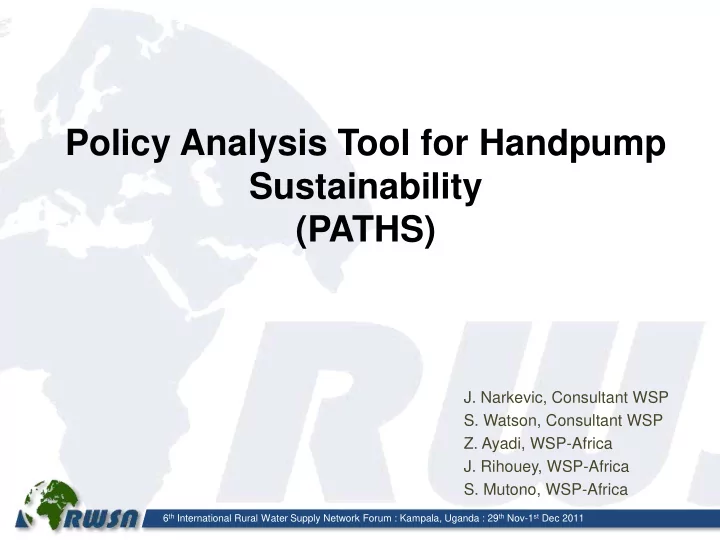

Policy Analysis Tool for Handpump Sustainability (PATHS) J. Narkevic, Consultant WSP S. Watson, Consultant WSP Z. Ayadi, WSP-Africa J. Rihouey, WSP-Africa S. Mutono, WSP-Africa 6 th International Rural Water Supply Network Forum : Kampala, Uganda : 29 th Nov-1 st Dec 2011
Presentation Outline • What is PATHS? • What are its components? • How is it used? 6 th International Rural Water Supply Network Forum : Kampala, Uganda : 29 th Nov-1 st Dec 2011
One Question in Two Parts Why do hand pumps fail… … and why don’t people fix them? 6 th International Rural Water Supply Network Forum : Kampala, Uganda : 29 th Nov-1 st Dec 2011
Proposed Objectives Where we would like to be Where we are… in the medium- term… • 60%-70% of HPs function • 90% of HPs function • Capital cost recov < 20% • Capital cost recov > 50% • Avg. working life 3 - 8 yrs. • Avg. working life 9 - 15 yrs. • Source water insecurity • Source water security • Community management • Community choice • Install – repair – re-install – repair - upgrade • Install – maintain - upgrade 6 th International Rural Water Supply Network Forum : Kampala, Uganda : 29 th Nov-1 st Dec 2011
What is PATHS? Policy Analysis Tool for Handpump Sustainability (PATHS) is an analytical process and software tool designed to assess country policies and practices for making hand pumps function sustainably in rural areas. 6 th International Rural Water Supply Network Forum : Kampala, Uganda : 29 th Nov-1 st Dec 2011
PATHS is designed for use where... Hand pumps supply a large percentage of the rural population Hand pumps are expected to be used in the country for many years to come Hand pumps consistently fail or underperform A country has long recognized the need to improve hand pump sustainability, but is unsure of how best to tackle the problem 6 th International Rural Water Supply Network Forum : Kampala, Uganda : 29 th Nov-1 st Dec 2011
PATHS is composed of... A proposed methodology (process) An interactive computer programme (English and French) which includes the following sections: 1. Country and Sector Information for determining utilisation groups (four groups) 2. Policy Scan (policy framework, policy implementation, policy dynamics) 3. Sustainability Factor Scan (6 dimensions) 4. Sustainability Thresholds and Scoring with automatically generated Findings and Recommendations 6 th International Rural Water Supply Network Forum : Kampala, Uganda : 29 th Nov-1 st Dec 2011
Policy Scan – Sample Questions P1. Is there a national policy in place stating that the Demand Responsive Approach (DRA) is to be applied for rural water supply projects? (YES or NO) P16. Has the hand pump spare parts plan, strategy, or approach been updated or changed in the past four years? (YES or NO) P36. Is regular post-construction support being delivered to user groups with hand pumps in at least 50% of the national territory? (YES or NO) 6 th International Rural Water Supply Network Forum : Kampala, Uganda : 29 th Nov-1 st Dec 2011
Sustainability Factor Scan 1. Consumer Demand (11 Questions) 2. Social and Human Resources (7 Qs) 3. Financial (7 Qs) 4. Environmental (6 Qs) 5. Institutional (5 Qs) 6. Technical (10 Qs) Total of 46 questions 6 th International Rural Water Supply Network Forum : Kampala, Uganda : 29 th Nov-1 st Dec 2011
Sustainability Factor Scan – Consumer Demand Sample Question 1. The user group can choose the handpump model that they prefer … 1. at least 75% of the time 3 pts 2. around half the time 2 pts 3. around 25% of the time 1 pt 4. The user group rarely chooses. The handpump model is selected based upon technical criteria only. 0 pts 6 th International Rural Water Supply Network Forum : Kampala, Uganda : 29 th Nov-1 st Dec 2011
Scored Results • Policy Environment Score • Policy Implementation Score • Policy Dynamics Score • Six Sustainability Factor Scores • Overall Sustainability Factor Score • Overall Country Score • Hardware / Software Scores and Ratio • Flags and Findings (Text and graphics) 6 th International Rural Water Supply Network Forum : Kampala, Uganda : 29 th Nov-1 st Dec 2011
Social and Human Resources Less than 3.0 = Very limited local capacity to successfully operate and maintain hand pumps. Urgent review may be needed of community dynamics, management options, and/or long-term operation and maintenance arrangements. 3.0 to 5.0 = Limited local capacity for the successful operation and maintenance of hand pumps. Attention may need to be focused on policies and actions in human resource development. 5.5 to 7.5 = Basic local capacity for the operation and maintenance of hand pumps in place, though more work may need to be done in specific areas of human resource development. 8.0 or more = Local capacity for long-term operations and maintenance of hand pumps in place and constantly being upgraded. 6 th International Rural Water Supply Network Forum : Kampala, Uganda : 29 th Nov-1 st Dec 2011
Sample Final Report Policies Policy Implementation Concentration of Effort Gaps Draw comparisons 6 th International Rural Water Supply Network Forum : Kampala, Uganda : 29 th Nov-1 st Dec 2011
Final Testing Process Any country interested in the final testing of the PATHS tool please contact J. Narkevic after the presentation, or contact Sam Mutono with WSP-Uganda by e-mail: <wsp@worldbank.org> 6 th International Rural Water Supply Network Forum : Kampala, Uganda : 29 th Nov-1 st Dec 2011
Recommend
More recommend